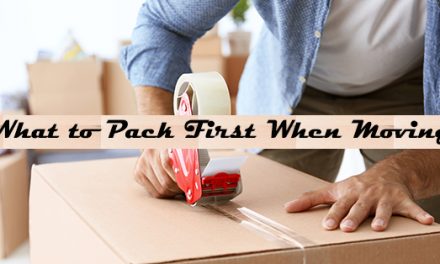 The process of moving from one home to another is believed to be one of the most stressful events a person can experience in their lifetime.
The process of moving from one home to another is believed to be one of the most stressful events a person can experience in their lifetime.
There are a number of valid reasons why a house move is so stressful (see below) but the truth is that there are also good ways to manage the stress of moving and thus have a relatively stress-free relocation.
And even though you’ll happen to face numerous stressors before, during and after the residential move, stress is definitely bad for you, so you must do everything in your power to keep your stress level within reasonable limits.
How to reduce stress when moving house? What an excellent question, indeed!
Here are the top 10 ways to have a stress-free move.
#1. Give yourself as much time as possible
One of the major reasons why moving is so stressful has everything to do with TIME:
- how much time you have until the day of the move, and
- how to manage that time in the best possible way.
The less time you have to prepare properly for Moving day, the more stress you’ll experience because your mind just cannot process the thought of what should happen if you don’t finish your preparations on time. So, the fear of not being ready for the arrival of your move day will only add extra pressure – time pressure you may not know how to handle.
It’s never fun to have to work around the clock in order to complete all the tasks in your moving calendar. So, to reduce the stress of moving to a manageable level, start the preparations as soon as you possibly can, ideally immediately after the house move is confirmed.
Here’s the deal: the more time you’ve given yourself to work on your moving tasks, the less pressure you should feel as the day of the move gets nearer and nearer, even when something unexpected comes up and slows down your progress.
#2. Know how much your move will cost you
So, now you know how to neutralize, more or less, the first big stressing factor when moving house – TIME. The stress-free formula is simple enough: more time, less stress; less time, more stress.

It’s critical that you know the cost of your move beforehand.
Next, let’s take a look at another major stressor when moving from one home to another – MONEY. The moment you learn of the impending move, you start worrying about whether you’ll have enough money to cover the moving expenses simply because you have no idea how much the move will cost.
The cost of your upcoming move is a genuine worry, especially if you’re moving out for the first time. Your savings will be at risk, and what if you don’t have enough money to move out? And as your financial concerns intensify, so will the moving stress inside you.
One excellent way to reduce the stress of moving is to learn how much your move will cost you in advance. And the only way to do that is to request on-site inspections from several top-rated moving companies in your city.
DO NOT trust cost estimates done over the phone or via e-mail because they can never be as accurate as the ones issued after in-house personal surveys from experienced moving experts.
Learn the cost of your move: Moving cost calculator
#3. Get organized with the help of a moving checklist
Having enough time to get ready for your move is fundamental for keeping the stress level within healthy limits – 8 weeks is usually a good time frame to initiate the preparations. However, more important than how much time you have is how exactly you organize that time. Right?
In other words, one of the secrets to reducing the stress of moving is to use efficiently the time you’ve got until the day your movers knock on your door or your rental truck gets parked in front of your home. And can you do that? It’s easier than you think.
Follow a moving checklist – a detailed to-do list that will list all the tasks you need to do in order to get 100% ready to move out. There are many advantages to having a trusted moving checklist at hand when moving house, but the greatest of them all is having that easing sense that you’re on the right path.
That’s right – each time you check a task as complete, you’ll know that you’re actually making progress, and that fact alone will keep you calm and stress-free because you know you’re going to get it all done on time.
MOVING CHECKLIST: free, interactive, complete
#4. Ask friends and family for help
One thing is sure – moving house causes stress and the big question is how to reduce and even avoid that extra pressure that tends to build up and has the potential to reach dangerous levels.

Ideally, the entire family should be involved in the move. After all, moving is a family thing.
Another way to reduce moving stress is to know that you won’t be alone during that tough transitional period – that is, that you’ll have friends and family to give you a hand when you need it the most. Remember that the crazy-busy moving preparations have never been meant to be tackled by a single person.
It’s not easy to ask for help, but sometimes you have no other option but to reach out to your friends and ask them to spare several hours to help you sort out and pack your items, and most of all – help you move the heavy things in your home, such as full cardboard boxes, heavy appliances and pieces of furniture.
Unless you’ve decided to hire a reputable full-service mover (great choice!), you’re going to have to reach out to your pals early enough as to avoid disrupting their own plans and schedules. Most of them will have moved at least once in their lives, so they will understand how hard that situation must be for you.
How to ask friends to help you move
#5. Find a full-service mover you can really trust
When you’re moving across the country or you’re moving with too many high-value items which you don’t know how to protect during the actual move, then it makes all the sense in the world to hire the services of a full-service moving company.
In reality, finding a full-service mover is probably the best way to deal with moving stress – you just get to watch how experienced professionals pack up your household items and then carry those heavy furniture pieces and appliances to the moving vehicle for safe loading and transportation.
Without a doubt, finding a reliable full-service mover should give you a peace of mind that your items will be safe. Also, calling in the pros will open up some free time for you to take care of other important things besides packing and lugging heavy stuff around – like saying goodbye to your friends, for example.
Remove the stress out of your move once and for all! Just follow the link below to learn the 7 steps to finding the best long distance mover in your area – the best in terms of reputation, trustworthiness, professionalism, and of course – affordability.
How to find a reliable mover in 7 steps
#6. Declutter your home
Believe it or not, clutter tends to create stress. The mere thought of having to pack and move tons of household items to the new home will keep you worried and nervous throughout the move.

Declutter your home and feel the stress going up in smoke.
How much time will it take to pack all the things you own – some of which you may never need again?
How much money will it cost to first pack them all (the cost of packing materials) and then ship them to the new address (transportation costs)?
One of the best ways to avoid stress when moving house is to take the unique opportunity to get rid of all the clutter in your home. Once you do that, you’ll be left only with the things you really need and you really want. As a result, the new apartment or house will be tidier and much more spacious having sorted out your belongings from the one home.
Go through your things, one by one, and decide where each item will go. Group all the things you won’t be taking with you into 3 major categories: Sell, Donate, Throw Away.
Organize a profitable garage sale before the move to earn some fresh cash or do a good thing for the community and donate some of the items to a charity. Throw away the useless stuff.
Clutter Unwanted: How to get rid of stuff when moving
#7. Pack with a strategic plan in your head
Moving stress and anxiety start to build up from the moment you learn of the upcoming house move. It’s inevitable to get worried about what’s about to happen and how you’re going to organize the entire move, and of course – how much money will the move cost, plus whether or not you’ll be able to finish the preparations on time.
And then comes packing for a move! If you can afford to hire professional packers, then that’s great. If not, then you’re going to need to find a way to cope with the stress of packing as it believed to be the most challenging moving task you’ll need to take care of prior to Moving day.
Reduce the stress of moving by packing up your home with a good plan in your head. Once your home is clutter-free, it’ll be much easier for you to sort out and pack your belongings.
- Start packing ASAP, right after the house move becomes a matter of time.
- Begin packing from the toughest rooms to pack, usually the storage areas.
- Gather the required packing materials beforehand to avoid delays.
- Prepare an essentials box with all the absolute necessities and keep it with you throughout the move.
- Get packing help from friends and family to make it on time.
And above all else, follow a good packing checklist to stay 100% organized when packing your home for a move.
#8. Protect your valuables
One of the reasons why moving is so stressful is because all your valuable items get moved from one place to another, sometimes thousands of miles away. And because of that, there’s just never a guarantee that all of your prized possession will survive the relocation intact. And that alone could be rather alarming and distressing to begin with.

Who’s more qualified than top-rated furniture movers to pack and move your lovely antique furniture?
Of course, there are valuables and valuables – a piece of clothing you just love that much is different in value than a super expensive piece of jewelry. Nevertheless, you will definitely want to protect all of your valuables during the move.
So, here are some good ways to avoid stress when you’re moving by knowing that your valuable items will be safe:
- Keep small valuables like jewelry pieces, cash, bank cards, electronic equipment, etc. with you during the entire move;
- Hire experienced professionals to move the larger valuables in your home such as a piano, a grandfather clock, antique furniture, etc.
- Use plenty of packing paper and bubble wrap when packing smaller valuables by yourself, especially when those high-value items are very fragile as well.
- Purchase adequate moving insurance from your professional mover or directly from an insurance company – you must have the peace of mind that your valuables are well-insured should the worst happened to them.
The best packing tips you’ll ever need
#9. Make moving day as safe as it can be
Our tips for a stress-free move continue with some good advice on how to keep moving day safe for you and for your family members. After all, it can be rather disquieting to think that something bad, like an accident, could happen on the day of the move when things tend to get a bit crazy.
To guarantee the safety of everyone on the move day should be enough to reduce the overall moving stress you must be experiencing. Here’s what you must do to keep moving day from becoming dangerous:
- Get help. Moving large and heavy items is not a task for one person. Hire top-rated furniture movers or ask your pals to help you during that difficult period of relocation.
- Use proper equipment. When moving on your own, make sure you have the right moving tools to keep things safe. Rent or purchase a moving dolly to move your bulky items quickly and safely.
- Quality packing supplies. Using packing materials of the highest quality will prevent any accidents such as a cardboard box breaking while it’s being carried.
- Keep away running feet. Small kids and pets have no business being amidst the action on moving day. Arrange for somebody you can trust to take care of your loved ones, preferably in a room away from possible harm.
6 safety tips for moving furniture
#10 Take good care of yourself

Have meaningful breaks from packing and moving to reduce the tension of the home moving process.
You already know what makes moving stressful and how to reduce the stress during the move. Use the above stress-free moving tips and you should be able to have a relatively worry-free relocation from beginning to end.
One final thing you can do to get rid of the accumulated tension is to remember to keep taking care of yourself. During a super stressful period like a house move, some people stop eating properly – they start skipping meals, relying on junk food and coffee to get them through the day. Try hard not to do all of that.
Also, make sure you get enough sleep to feel somewhat refreshed the next day, and don’t neglect entirely important breaks from work or breaths of fresh air. Oh, and don’t forget the relaxing and revitalizing showers to keep your energy up and stress level down.









